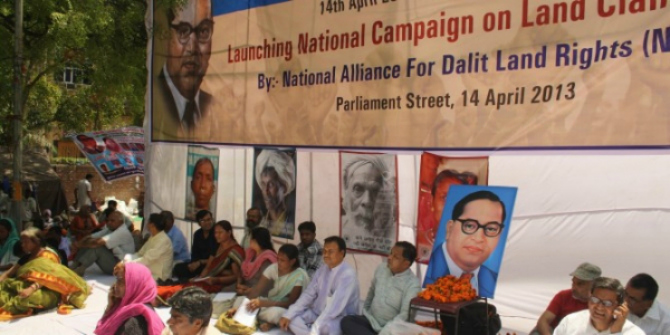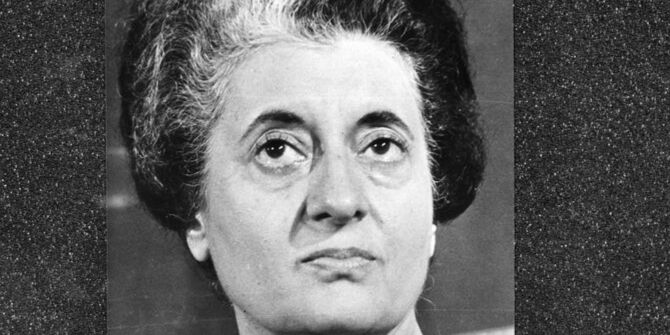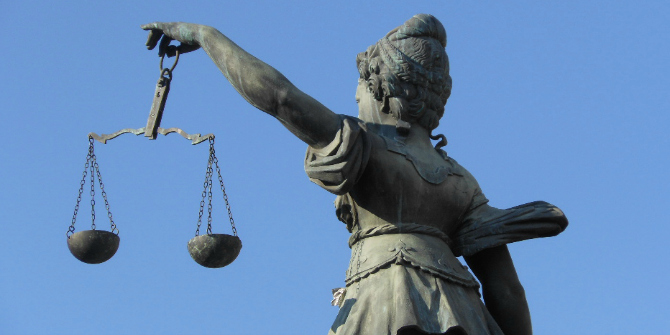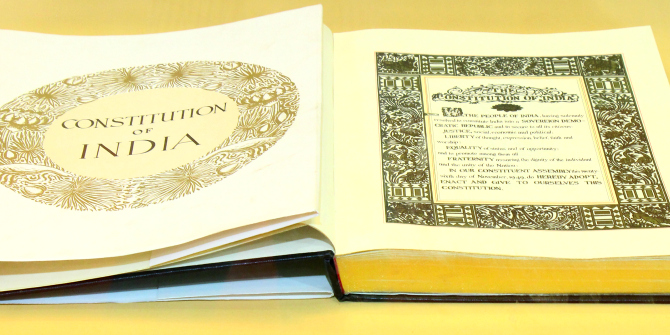Oxford University Press has just published a five-volume box-set entitled B.R Ambedkar: The Quest for Justice. In this post, the collection’s editor Aakash Singh Rathore discusses the origins and rationale of this massive project devoted to the life and legacy of the famous jurist and social reformer and briefly sketches its contents across the five volumes.
Dr B.R. Ambedkar is a celebrated LSE alumnus. You can find out more about his life and his time at LSE on LSE History blog.
B.R. Ambedkar: The Quest for Justice. Aakash Singh Rathore (ed.). Oxford University Press. 2021.
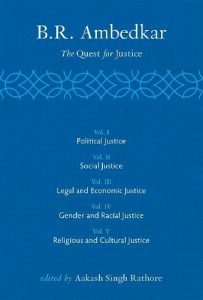 Find this box-set (affiliate link):
Find this box-set (affiliate link): ![]()
The Quest for Justice
Social activism in India today – from farmers’ and students’ protests to movements for caste, religious or gender equality to advocacy for the economically exploited and culturally marginalised – is much inspired by the profound and lasting legacy of B.R. Ambedkar. Known abroad primarily as the chief architect of the Indian Constitution, Ambedkar’s influence across the social, political, ideological, cultural, religious and legal spheres of the land of his birth cannot be overestimated. It appears that the rest of the world is also slowly beginning to more deeply feel or appreciate his wider impact.
Each 14 April, Dr Ambedkar’s birthday is celebrated on a large scale in India. Beyond being simply a national holiday, Ambedkar Jayanti is a day where local communities come alive with cultural activities, NGOs and other institutions ramp up various campaigns for social awareness, political parties organise massive rallies to extol the statesman and claim him as their own and all of academia is abuzz with special lectures, seminars and conferences of various scales: regional, national and international. This new multivolume collection, B.R. Ambedkar: The Quest for Justice, originated precisely during one such large-scale event, an international conference on Dr Ambedkar called ‘The Quest for Equity, Reclaiming Social Justice’, organised by the Government of Karnataka and held in Bangalore in 2017. There were more than 350 speakers from around the world presenting papers, and several thousand participants.
The conference was a forum for serious scholars, but it was also a social forum. It was launched keeping in view that the values of social, political and economic justice that Dr Ambedkar had relentlessly struggled toward throughout his life and political career, and that he had finally managed to enshrine within the democratic Constitution of the Republic of India, were under attack at numerous levels. Constitutional norms and public institutions created in order to fight against dominance and subservience were proving inadequate or being subverted; norms and policy were often merely paying lip service to Ambedkarite egalitarian considerations; and the rise of social intolerance and exclusion tended to effectively whittle down and even sabotage Ambedkar’s inclusive conception of polity and citizenship.
Ambedkar had understood social inequality and diversity to be layered and multidimensional, and that the state had to reckon with several competing centres of religious, communal and cultural allegiances. Naturally, the complexity of the social, political and economic environment in which the value of social justice must be envisaged had undergone significant changes over the last 70 years of the Indian Republic. Inspired by the clarity of Ambedkar’s vision and the unflinching nature of his commitment, new sites for social and political assertions have been re-emerging to face the new contemporary challenges, each evoking the legacy of Ambedkar, each renewing the call for justice. While working my way through the hundreds of academic papers presented at the Ambedkar International Conference and editing these five volumes of scholarship, it became clear to me that Ambedkar’s sophisticated yet practical and grounded approach to critical intellectual and policy challenges might actually inspire similar interventions elsewhere in the world, particularly in the Global South.
Thus, in the light of the conference, the box-set emerged as an invitation to scholars and perhaps even policymakers to substantially rethink current social, political and economic paradigms, driven by Dr B.R. Ambedkar’s imaginative and insightful work. Since justice was the foremost concern of Ambedkar, and since both Ambedkar and the contributing authors approached the idea of justice in a multidisciplinary way, I decided to organise the five volumes thematically around eight different spheres of justice: that is, in terms of political, social, legal, economic, gender, racial, religious and cultural justice.
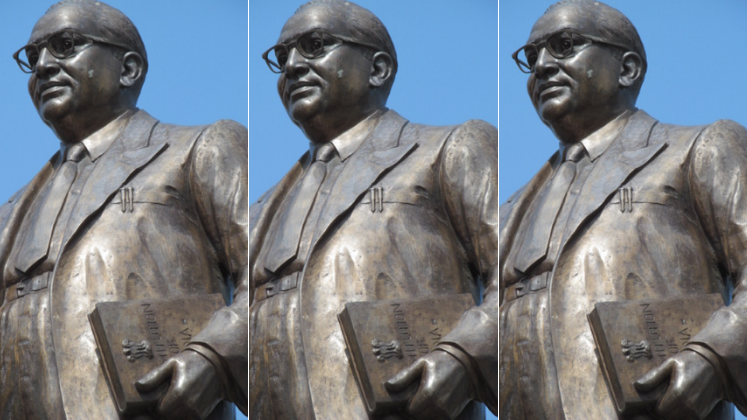
These five volumes of papers collectively explore the major themes of research surrounding the rather massive oeuvre of Dr B.R. Ambedkar. They provide a summary evaluation of the state of Ambedkar studies internationally, highlight research trends both about and inspired by Ambedkar and open up lines of future enquiry.
Volume One focuses specifically on the theme of political justice. With a Foreword by Shashi Tharoor and contributions from foremost political theorists, the volume begins with a piece on the intellectual and political legacy of Ambedkar by Bhikhu Parekh. Several chapters then focus on the centrality of democracy and equality to Ambedkar’s political philosophy as a whole, and juxtapose Ambedkar’s political thought to other important thinkers of preceding or succeeding generations, including Antonio Gramsci, John Dewey, M.K. Gandhi and John Rawls.
Volume Two focuses on social justice. With contributions from foremost sociologists, social theorists, social and political philosophers and social activists, the volume begins with a piece on Ambedkar’s theory of the social by Martin Fuchs. This is followed up by an exploration of the centrality of Ambedkar’s social vision to his thought and work as a whole. Several contributors focus on social justice at the local or state level. Others focus at the transnational level: for example, Meena Dhanda on the UK and David Gellner on Nepal. Suraj Yengde then supplements these contributions through an analysis of Ambedkar’s internationalisation of social justice.
Volume Three covers the two themes of legal justice and economic justice. The first part explores literature on the Constitution of India and its institutions, the idea of constitutional morality, rights and the rule of law as well as Ambedkarite jurisprudence. With contributions from leading jurists, the volume begins with a piece on the ‘insurgent’ legal theory of Ambedkar by Upendra Baxi. The second part turns to a variety of issues in economic justice anchored in Ambedkar’s own economic methodology and philosophy.
Volume Four treats of gender justice and of racial justice. The first part explores Ambedkar’s impact on efforts to achieve gender justice in India, and effects various readings of Ambedkar as a feminist. The second part turns to comparisons of race and caste, and explores the ways in which the movements for racial justice and caste equality can learn from one another and seek strategies of synergy. With contributions from feminist theorists and critical race theorists, the volume covers caste, class and gender intersectionality, stigma and humiliation and issues of gender justice both at the theoretical level as well as specific empirical case studies. Other chapters offer comparisons of Ambedkar with American stalwarts of racial justice such as W.E.B. Du Bois and Martin Luther King, and applications of Ambedkarite praxis to diverse landscapes such as post-Apartheid South Africa as well as the United States.
Volume Five covers religious justice and cultural justice. The first part addresses conversion, Navayana Buddhism and liberation theology. The second part explores timely issues in cultural justice inspired by Ambedkar’s own activism and struggles. With contributions from across a wide spectrum of disciplines in the humanities and social sciences, the volume begins with a piece by Laurence Simon on Ambedkar’s prophetic role in liberating an oppressed people through religious leadership. In the second part, issues of cultural justice are presented with a focus on dignity, myth, cultural rights and academic space.
Despite the wide range of themes spread across these five volumes, the collection as a whole is oriented toward articulable specific aims and objectives. These are inspired by and fully consistent with the life and legacy of Dr Ambedkar, a man who was, on the one hand, a scholar of indubitable genius, and on the other hand, a dynamic agent of social and political action.
Firstly, B.R. Ambedkar: The Quest for Justice seeks to explore the multifaceted idea of justice in dialogue with Ambedkar’s opus for a society that encompasses manifold social inequalities, deep diversities, exclusion and marginality. Secondly, in dialogue with Ambedkar’s writings, the contributions to the collection overall aim to suggest constitutional, institutional and policy responses to the concerns of justice, and to reformulate the conceptual and policy linkages between social justice and other related norms and concerns. Thirdly, through high-level scholarship, this collection aims to help identify modes of thought and agency and social and political practices inimical to the pursuit of justice. It seeks to delineate social and political agency and modes of action conducive to the furtherance of justice in line with Dr Ambedkar’s own writings and mission.
Thus, in sum, Dr Ambedkar’s conception of justice and his life’s work shaping the idea of India offer this collection vantage points for sustained reflection on concerns of justice and its relation to other human values. This is particularly relevant, indeed urgent, in our present day, not only in India but also throughout the world.
Note: This review gives the views of the author, and not the position of the LSE Review of Books blog, or of the London School of Economics. The LSE RB blog may receive a small commission if you choose to make a purchase through the above Amazon affiliate link. This is entirely independent of the coverage of the book on LSE Review of Books.
Image Credit: Central statue of Dr Ambedkar in Dr. Babasaheb Ambedkar Marathwada University, India (JAIBHIM5 CC BY SA 3.0).



